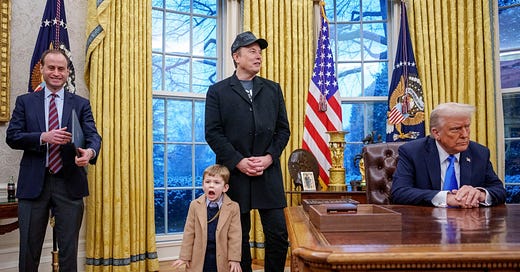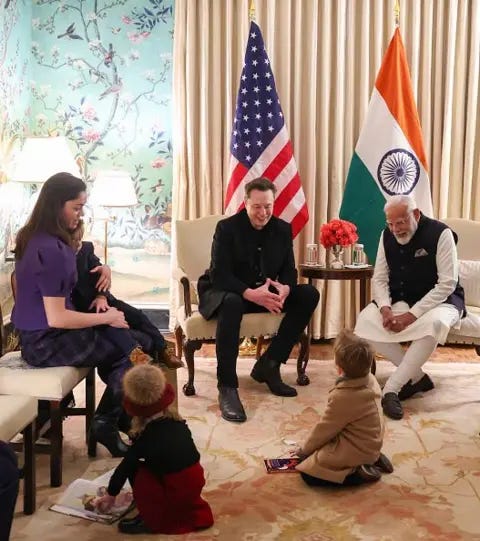By now you’ve likely seen plenty of coverage of Elon Musk’s bonkers bring-your-child-to-work exploits. Here’s four-year-old X – I’m sorry, X Æ A-Xii –in the Oval Office, a captive audience for his dad’s strange press briefing:
Here’s X in a meeting with the Prime Minister of India:
One imagines, but never quite knows with Musk, that this is a PR strategy designed to distract from the destruction he’s currently wreaking: Yes, I am systematically dismantling the federal government, but look at this cute kid on my shoulders! I’m just a humble dad, not a megalomaniac oligarch wannabe!
I suppose it is technically possible that Musk’s childcare fell through at the last minute, just as he was about to jump into the car to the White House, and, like many parents, he had little choice but to bring X along.
Yeah, no. This was a choice, and one calculated to make him look good – and/or to emphasize the fact that he has zero f&#@s to give about pedestrian concerns like “social norms.”
Let’s set aside the question of how a similarly positioned woman might have been perceived for making the same choice. (Hint: Not well.) And let’s also set aside the question of what this behavior says about Elon’s psyche. (Is it normal to refer to your toddler as an “emotional support human”? No, it is not.)
Instead, I want to use Musk’s publicity stunt as an excuse to reflect on the state of contemporary fatherhood.
What do we expect of dads? And is it enough?
The good news is that, normatively speaking, we’ve moved well beyond the 1950s model. To be considered a “good dad” today, it’s not enough to be a financial provider. Good dads still bring home the bacon, but they also spend significant time with their children and develop close emotional bonds.
One of my interviewees, Chris, a late-40s father of two, dismissively described his own father this way: “My dad was kinda—and he still is—just the money: ‘Here’s money.’” Chris, like many contemporary fathers, was striving for a closer relationship with his daughters.
Data on how contemporary fathers use their time shows a fair bit of change since the days when Chris was a kid. Married fathers spent an average of 8.3 hours per week on childcare in 2022-23, way up from the average of 2.4 hours (!!!) they spent caring for their kids each week in 1975.1
That’s excellent news. The rub, though, is that when we look closely at the tasks that tend to fill those 8-ish hours, we see that dads have not markedly stepped up in the parenting grunt-work department. Fathers’ time is disproportionately spent on activities like playing with their kids and watching TV with them.
Again, Chris is a case in point. His wife Kathleen described him as “Fun Dad”: he played with their daughters, coached their soccer teams, and took them on excursions, she said, but wasn’t so great about cajoling them to do their homework or helping them get ready for school in the morning.
In addition to being “fun,” a lot of Chris’s fathering was also quite visible. It took place at the soccer field, or the park, or the local Chuck E. Cheese. Researchers Carla Shows and Naomi Gerstel call this kind of behavior “public fatherhood.” In a study comparing the fathering behaviors of surgeons and EMTs (alas, no billionaires in their sample), they found that the high-earning fathers showed up for events like sports games and school concerts and outings like neighborhood trick-or-treating. But they left most of the less-visible daily care work to their wives.2
Musk is, as ever, in a category all his own. But dragging X along to a White House press conference is arguably his version of taking a child to Chuck E. Cheese. I highly doubt he remembered to bring snacks, or that he went home afterward and prepared X’s dinner or drew him a bath.
Musk is, like many other elite dads, in a kind of no-lose situation. He almost certainly hasn’t been fielding concerned questions about his children’s well-being when he appears in public without them: “But Elon, who’s caring for little X while you disembowel the federal bureaucracy?” By bringing X along, though, he gets brownie points for being an “involved father” and “so good with his children.”
Grimes, X’s mother, probably isn’t doing a ton of parental grunt work, either, to be fair. She does, however, appear to be the parent more worried about the child’s well-being: Grimes reportedly expressed concern that a lengthy press briefing was perhaps not the best atmosphere for a child. For her pains, she’ll probably get pilloried by X and his father as “no fun” or “a buzzkill.”
Because when dads lay claim to the fun parts of parenting, they relegate moms to the hard stuff, the stuff that doesn’t go over well with the child set: boundaries like bedtime and trials like eating vegetables and completing homework. I hear that daily care work can be rewarding in its own right (I’ll report back in six months), but surely few mothers relish the role of enforcing unpopular rules and boundaries, particularly when they’re not supported in those endeavors by their partner. Fun Dads too often lead to Frazzled Moms.
We do need more fathers, and particularly fathers in leadership, setting an example. When men in positions of power take as much paternity leave as they can, or turn down high-profile opportunities in order to prioritize family time, they help reinforce the notion that being a good man does not necessarily mean always putting your career first.
The kind of example we need is, alas, not the one Musk is setting.
It’s good that contemporary dads are building stronger connections with their children, and it’s (mostly) good that they’re making those connections visible to other men who might be inspired to emulate them. But it’s not good enough.
The relevant numbers for married mothers are 7.3 in 1975 and 14.7 in 2022-23. If they seem low, it’s likely because a lot of what we might think of as childcare (e.g., preparing meals), is classified as housework.
EMT dads, meanwhile, spent more of their childcare time on the routines of everyday life: daycare pickup, dinner prep, bedtime.






Hmm. So the dads who at work are king of the OR take on the same role at home, whereas the EMT’s who do hands-on stuff but have to call in for orders, are more into shared work. Surprised??? Don’t working class dads statistically do more “real” work at home than professionals? BTW, my 1950’s dad cooked breakfast, picked us up at school to go home for lunch, and was home by 5:30 every night. Sometimes he’d stop by the bakery or fish store. He read to us, taught us to use tools, planned outings to museums and parks. If my mother looked tired in the evening, he’d make her rest while he did the dishes with us. Traditional roles until I was in high school, but both were very sensitive to their partner’s needs.